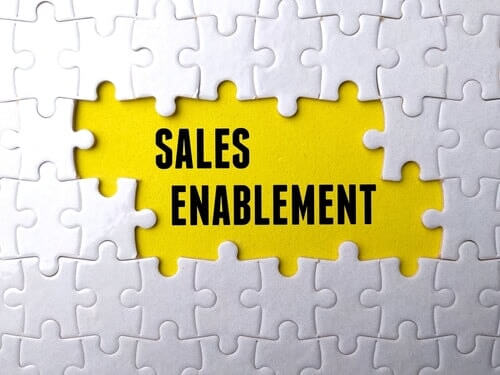
Is Sales Enablement The Next Big Thing for Law Firms?
Research says that individuals only retain about 10% of what they are taught in-classroom training. In fact, it's estimated that half of classroom learning is lost within the first 24 hours. While this type of instruction is still required as part of the professional development process, one-off classroom instruction is inadequate to build the knowledge and skills that lead to new behaviours. This is especially true when learning new subjects, such as lawyers who are learning new business development skills.
To build new skills and behaviours, learners need to have the learning reinforced continuously and in multiple ways. You can do this using quizzes and exercises, one-on-one coaching, group coaching, and on-the-job practice (where skills are applied in real-world settings). These 'follow-on reinforcement strategies' can improve skills development and knowledge retention by as much as 90%.
For law firms, this type of continuous learning loop is rarely used to teach business development skills (although I know of two that are developing similar programs). Law firms can look to a growing trend, however, among their corporate brethren as a model to solve the business development training challenge. It's called Sales Enablement. As you will read, firms that create this type of business development learning culture, learn more about how to sell individual practices, better facilitate new engagements, understand better what to look for in potential hires, and build better and more collaborative teams around revenue growth. Simply put, sales enablement builds business development cultures in law firms.
What is Sales Enablement?
The Association for Talent Development defines sales enablement as "the strategic and cross-functional effort to increase the productivity of client-facing teams by providing ongoing and relevant resources throughout the buyer journey to drive business impact. It encompasses sales training, coaching, content creation, process improvement, talent development, and compensation, among other areas."
HubSpot states it more succinctly. It describes sales enablement as an "iterative process of providing your business's sales team with the resources they need to close more deals".
In short, sales enablement is how law firms can take control of their business development and marketing processes and improve the effectiveness of their revenue growth initiatives. Sales enablement, however, is a relatively new concept in legal services. To aid in this understanding, let's put sales enablement in the context of a real-world experience to which lawyers can relate.
What might sales enablement look like in the typical corporate law firm?
Let's use a data security practice area to illustrate what sales enablement might look like. I’m using that practice as an example because it has two distinct sales strategies. The first is a proactive 'advisory' sales approach in which sellers educate prospective clients about the risks of improperly protected data. The second is a reactive 'crisis response and management' approach in which sellers must position themselves as first responders to data breach incidents.
The first step in sales enablement is to map out the unique sales process, the most effective strategies, the buying situations, and the value propositions that will appeal to buyers of each sub-practice area, in this case, the 'advisory' practice and the 'crisis response' practice.
Not only do these two practices have different sales processes, but the training and coaching support will be unique to each. Exercises, quizzes, and training reinforcement strategies should relate to real-world situations making it easier for lawyers to learn because it is in the context of what they will experience.
Coaches (whether internal or external) should be versed in the training as well so they can anchor their advice to what the lawyer has learned (and avoid introducing new concepts that may confuse or conflict with their training). Marketing materials will vary as well. They must be concise and deliver only the most relevant and critical information about the practice based on the buying situation and needs.
And value propositions need to reflect the actual business situation rather than more broadly stated, and often empty, value promises. Furthermore, a data breach situation may involve a different set of value-added services than the value-added services defined for the data protection advisory service. And the metrics used to manage, report, and improve the processes will need to be adapted for each of the two practices, including coordinating the various technologies to enhance the sales enablement in each practice such as CRM systems, billing systems, finance, and content management systems.
How would training differ?
The training content should include the unique buying signals and sales triggers to listen or watch for, the relevant responses and conversion techniques to use in different buying situations, and an understanding of the buying journey that buyers will go through in their decision process. The stakeholders and decision-makers in each buying situation may also differ. Again, the training will need to be reinforced with customized techniques and tools that can help embed the knowledge and develop the skills in each lawyer.
During the content development process, key performance indicators (KPI), learning objectives, and reporting systems should be adapted to accurately track each lawyer’s performance. KPIs should monitor performance gaps so improvements can be made quickly. Finally, the improved knowledge gained through sales enablement should help inform recruiting profiles, hiring decisions, talent development programs, and compensation policies.
In Conclusion
It's evident from this example that sales enablement requires a close working relationship between professional development, marketing, and business development, finance and accounting, HR and recruiting, and practice management. But by aligning around sales performance, the firm will build a business development culture. Of course, the skills and knowledge required in leaders charged with creating a sales enablement program require a rare combination of strong sales and marketing experience, instructional design and training capabilities, project management skills, and process improvement abilities. Those individuals are admittedly hard to find at this point. But while it may take some time to put a program in place, the improvements in revenue and sustainable growth will more than pay for the time and effort. And, a sales enablement program will assure that the firm can grow organically and steadily into the future.
About Eric Dewey

The former chief marketing officer of several large law firms, Eric Dewey is a business development coach for lawyers who has been helping lawyers and other professional service providers win new business for more than 25 years. His approach is practical, client-centric and practice-specific, using tools and techniques developed over years of coaching lawyers from every imaginable practice area through a host of challenging situations.
Eric is the instructor-coach on eLegaltraining.com and has coached and advised hundreds of lawyers over his career on practice development, client account strategy, and opportunities research. He can be reached by email at Eric@eLegalTraining.com.
Also read top viewed Ai Legal article: The Role of AI in Legal Research.





